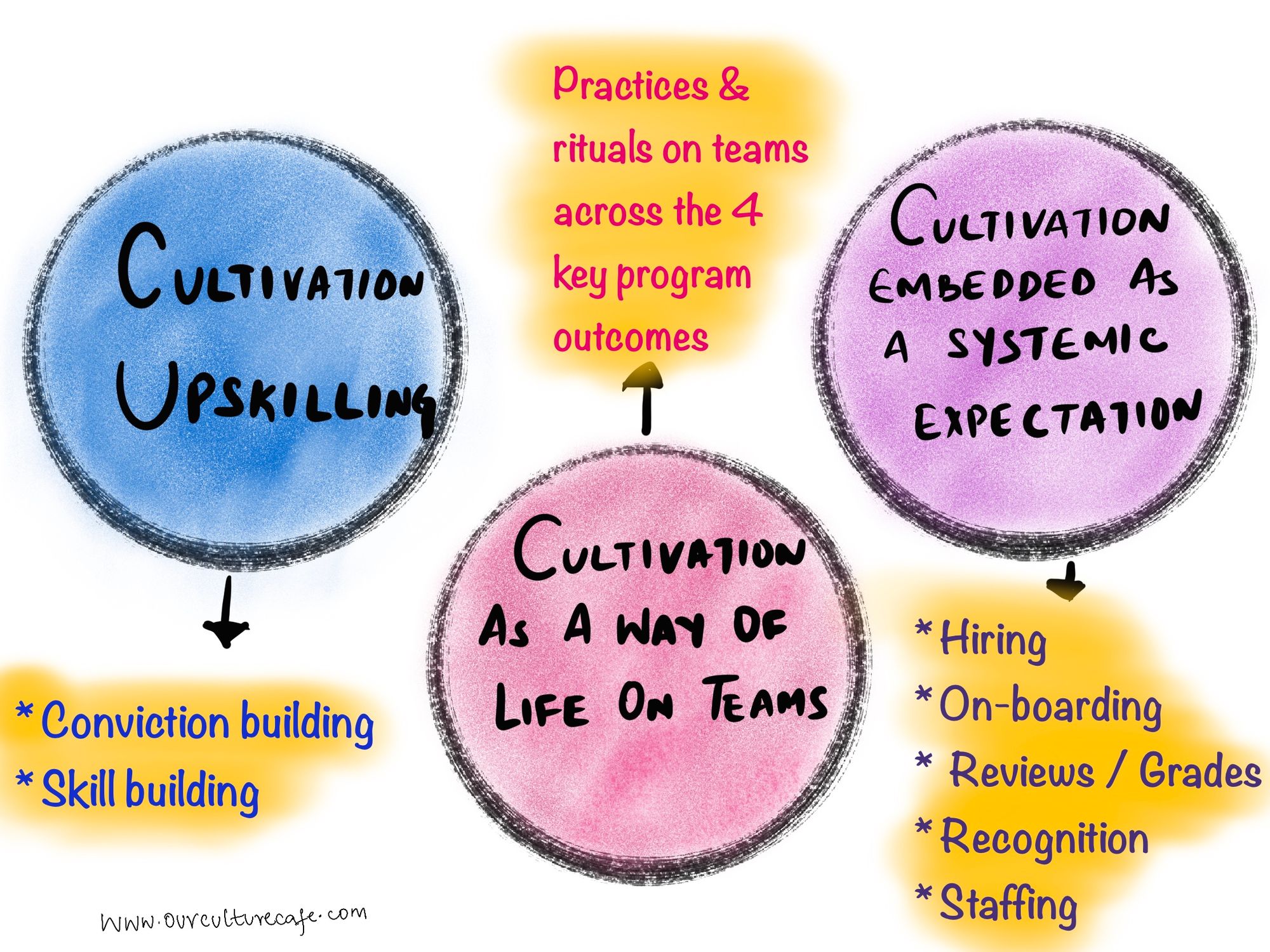How to Build a Cultivation Culture-Making it Real
The threefold approach at ThoughtWorks India for realising the 4 key outcomes of the cultivation program, in order to strengthen a culture of cultivation.

In an earlier article, we shared the four key components of a cultivation culture, which provide clarity on what this culture could look like when it's fully alive. In this post we will share the approach for enlivening these components & building a flourishing cultivation culture.
We propose adopting a threefold approach:

I. Cultivation Up-skilling & Conviction Building
As we strengthen the culture of cultivation, we need to become clear about which behaviours & skills align with it and then find ways to help ThoughtWorkers demonstrate / develop these. We’ve identified a repertoire of “cultivation behaviours” that provide clarity on how ThoughtWorkers can contribute to cultivation. These behaviours have two aspects:
a) the act itself
b) the skill & mindset to do it effectively.
For example, one of the cultivation behaviours we’ve identified is “Championing Feedback”. This requires people to not just give and receive feedback frequently (the act), but also be highly skilled at it so that it’s effective.
To reinforce the right mindset & help folks build cultivation related skills, we designed:
Conviction Building Resources: To help ThoughtWorkers understand what a culture of cultivation looks like, why it’s important for us to strengthen it & how a specific team can build it. While the original approach was to run several conviction building workshops throughout ThoughtWorks India, and materials to run these remain available, Our Culture Cafe is another resource now.
Skill building Workshops & Resources: We’ve designed & run several workshops to help ThoughtWorkers at India build cultivation related skills. Examples of some topics we tackle through these workshops are:
- Giving & Receiving Feedback
- Navigating Difficult Conversations
- Mentoring Skills
- Coaching Skills
- Influencing Skills
II. Cultivation as a Way of Life on Teams
This part of the approach focuses on realising the 4 key components of cultivation at a team level. It calls upon teams to take action autonomously in order to strengthen cultivation within their sphere. It places responsibility on teams to embed rituals, practices, behaviours & mindsets that over time create a strong culture of cultivation on their teams. Every team needs to take action to include feedback practices, spot & nurture potential in each other, learn together & share knowledge consistently & celebrate cultivation, in ways that make sense for them. The support available for teams to do this effectively is:
- Up-skilling workshops & materials with respect to cultivation related behaviours as described above
- Resources & ideas for practices, rituals & frameworks to realise the 4 key outcomes at team level. For example, there is a feedback playbook available that suggests ideas for team level feedback practices. Likewise we ran cultivation katas, where we shared ideas for learning & knowledge sharing rituals on teams amongst other things. We will continue to create & share more resources across all 4 program outcomes.
While teams create their own rituals & team leads are primarily accountable for ensuring this culture is nurtured on their teams, the ecosystem around teams also needs to create a way to keep conversations & reflections about the culture of cultivation alive.
Some ways in which that can happen are:
- Account leads proactively take steps to encourage their teams to strengthen cultivation culture. They include cultivation as a key dimension in their account level health checks & dashboards. Cultivation becomes a first class citizen in parameters for project & account reviews. This is one of the simplest ways to stay focused on nurturing this culture & creating the right nudges or interventions whenever required at project or account levels.
- The office leadership plays the role of “custodian” of this culture - meaning in conversations & reviews with teams & leaders, the office leadership keeps a keen eye on the cultural aspects of team health, with a prime focus on cultivation. They nudge teams & leaders to reflect on how strong cultivation culture is on their teams & provide the necessary support to them when needed.
III. Embed Cultivation as a systemic expectation
The main idea here is to embed cultivation into key organisational processes & functions like hiring, on-boarding, recognition, staffing, internal communications and so on. The functional & office leaders would primarily be responsible for driving this aspect. However, every ThoughtWorker would eventually participate in it as well. For example, while the Recruitment team has worked on getting the cultivation related attributes embedded in the hiring process, eventually it’s ThoughtWorkers who will lead interviews and ensure that cultivation remains a key parameter that is explored & evaluated for selection. Likewise, the office leadership may create rituals & spaces for recognising and celebrating great cultivation stories, but it’s ThoughtWorkers who will add meaning & content to them by participating. So in that sense, ThoughtWorks as a whole system will come together to strengthen cultivation through this aspect.
Cultivation needs to become a baseline expectation from all ThoughtWorkers across the organisation, and a key part of our identity. Embedding it in key functions & processes will help us do that. Much work has been done in the systemic aspect since the program began in India - cultivation is already embedded in hiring, annual review conversations, grade reviews & on-boarding . We need to continue working further across some other systemic dimensions over the coming months & years.
This threefold approach takes into consideration the various elements of org culture and draws out what kind of work will be required to strengthen cultivation culture. The intent of this approach is to create a robust ecosystem where a culture of cultivation can thrive.
Cover image credit: Kara Eads on Unsplash
Illustration of three fold approach: by Our Culture Cafe




